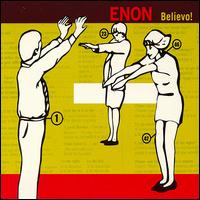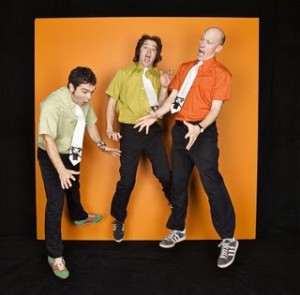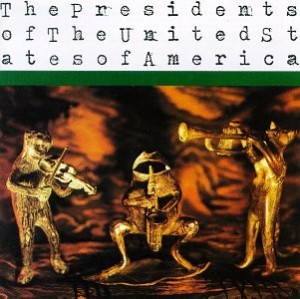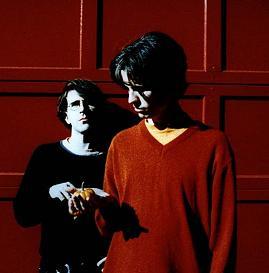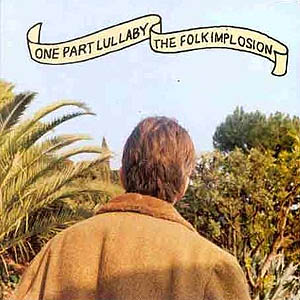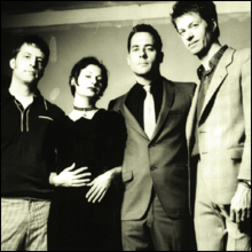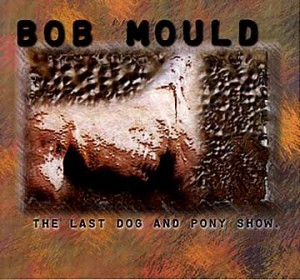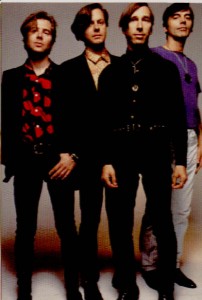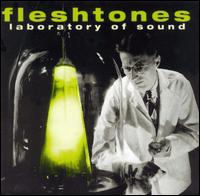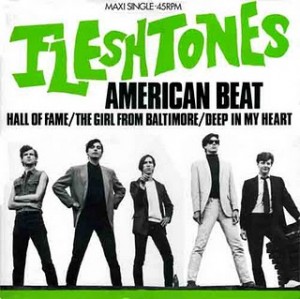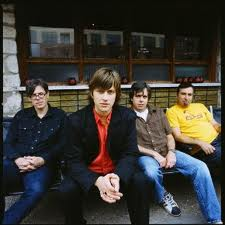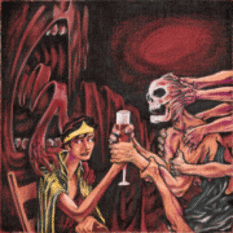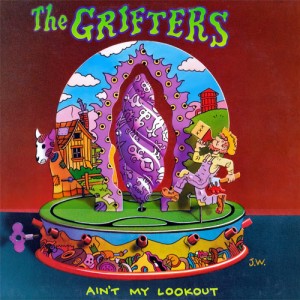FOREWORD: I’d become friendly with Firewater brainchild, Tod Ashley, pre-911, before he moved out of the World Trade Center-cited apartment shared with his Jetset Records-owning girlfriend and into the safer confines of Brooklyn. His underrated klezmer-gypsy-inspired band, Firewater, prefigured like-minded multi-ethnic Americanized combos Gogol Bordello and DeVotchka. A veritable supergroup of smartly collected indie rock talent worked with Tod throughout his career.
Their ’96 show at the Knitting Factory was a complete knockout. I’d first spoke to the former Cop Shoot Cop bassist during ’96 to promote Firewater’s audaciously-titled debut, Get Off The Cross…We Need The Wood For The Fire, at ex-bandmate Dave Ouimet’s NYC studio. Five years later, just before 911, I visited Tod at Jetset headquarters to discuss the equally enthralling Psychopharmacology.
I gave Tod my old stereo receiver since his was always on the fritz. We walked his dogs after one visit. Though I wasn’t as captivated by ‘03s The Man On The Burning Tightrope or ‘04s covers LP, Songs We Should Have Written, Firewater came back strong with ‘08s The Golden Hour (a collection of songs made during a three year stint in Pakistan, India, and Indonesia). These two articles originally appeared in Aquarian Weekly.
Former Cop Shoot Cop leader, Tod Ashley, and ex-Motherhead Bug’s Dave Ouimet (pronounced wee-may) left behind their previous New York bands to concentrate on klezmer and gypsy music (with a dash of inventive rock tossed in for good measure). The perfectly obnoxious and stylistically courageous Get Off The Cross…We Need The Wood For The Fire (Jetset Records) features a tastelessly hilarious cover photo of Jesus Christ smoking a cigarette and holding a Miller beer. Naturally rightwing radicals such as the Christian Coalition, the 700 Club, and the Catholic League, along with a few retail stores, objected to the mockingly blasphemous illustration. Yet I sincerely doubt any of these humorless organizations know about the respective paths both of these creative artists took before creating this rewarding project.
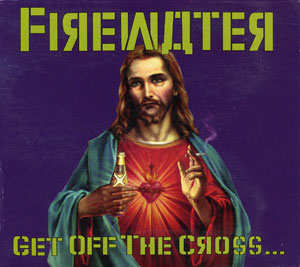 Except for the paranoiac “Some Strange Reaction,” the cabaret-like “Bourbon And Division,” and the lonely contemplation, “I Am The Rain,” Firewater rely solely on klezmer and gypsy styles. Recorded at RPM Studios on 12th Street with old fashioned gear from midnight to 9AM over three days, Get Off The Cross has a warm, disquieting sound that sinks in permanently after a few quick listens. Fellow Firewater members include guitarist Duane Denison (Jesus Lizard), percussioinst Yuval Gabay (Soul Coughing), sex-o-phonist Kurt Hoffman (Band Of Weeds and the Ordinaires), drummer Jungle Jim Komball (Laughing Hyenas and Mule), violinist Hahn Rowe (Foetus Inc.) and vocalist Jennifer Charles (Elysian Fields).
Except for the paranoiac “Some Strange Reaction,” the cabaret-like “Bourbon And Division,” and the lonely contemplation, “I Am The Rain,” Firewater rely solely on klezmer and gypsy styles. Recorded at RPM Studios on 12th Street with old fashioned gear from midnight to 9AM over three days, Get Off The Cross has a warm, disquieting sound that sinks in permanently after a few quick listens. Fellow Firewater members include guitarist Duane Denison (Jesus Lizard), percussioinst Yuval Gabay (Soul Coughing), sex-o-phonist Kurt Hoffman (Band Of Weeds and the Ordinaires), drummer Jungle Jim Komball (Laughing Hyenas and Mule), violinist Hahn Rowe (Foetus Inc.) and vocalist Jennifer Charles (Elysian Fields).
At Ouimet’s basement studio on Elizabeth Street, carnival music plays as he hands me a Budweiser Tallboy. Before my tape starts rolling, Tod A. comes strolling in from the wintry weather.
What made several highly respected underground artists decide to shift focus and attention to klezmer and gypsy music?
TOD: Dave and I tried to make a baby but created Firewater instead. (laughter)
What distinct differences separate klezmer from gypsy music?
DAVE: MY band Motherhead Bug was gypsy-influenced. Originally, most nomadic gypsies traveled from India to the United States with a strange mixture of ethnicity and culture. On the other hand, klezmer is basically from a Jewish traditional background. But many forms in the sense of improvisation and scales have been developed. Klezmer was used as Jewish wedding music and was Eastern European based. And although Tod nor I are Jewish, we became fascinated with its intricacies.
Was it difficult to drop the unique dual bass and drum sound of Cop Shoot Cop for Firewater’s eccentric sound?
TOD: Dave brought in most of the ideas for the songs. His influence was the main contributing factor.
DAVE: It seemed perfectly natural to me. It’s nontraditional rock like my former band, Motherhead Bug, which was a 12-piece circus.
TOD: Everyone and their uncle was in that band.
Would you consider the album cover appalling or offensive?
DAVE: Maybe it’s a bit juvenile, but if you have no sense of humor, why bother?
TOD: The funniest letters we’ve received have come from Southern inmates. They had time on their hands to write us and we gave them the proper response. The inmates could use some spelling help, but they provided entertainment for us.
So Jesus Christ was placed on the cover for shock value?
TOD: No. Jesus was a drinker but whether he smoked cigarettes is highly unlikely. The cover is not offensive. We’re bringing Jesus to a whole new generation. Jesus was a Jew. So it all fits.
DAVE: Early Boz Scaggs records used klezmer. Now the Klezmatics are doing it with success.
Dave, I read a quote claiming you couldn’t stand Jesus?
DAVE: Mainly I just can’t get into this religious bombardment from TV and media.
TOD: He has been overexposed to Jesus. (laughter) Jesus was an interesting historical figure. It’s amazing this rabbi from Israel affected 2,000 years of civilization. Saint Paul was his P.R. guy spreading the message. Paul was a tent maker preaching against early Christians with his doctrine. He appealed to non-Christians.
Do you believe Jesus died for our sins and rose from the dead?
TOD: There’s a theory he was drugged. That the wine he was given at the cross had opiates. It put him so out of it he appeared to be dead. But they never broke his legs like they normally did back then. He came off the cross after only four hours, got out of his drunken stupor and his friends helped him escape to live an normal life elsewhere. He had his own family. But it’s all conjecture. And frankly, the concept of God is ludicrous – though you can’t argue with ‘do unto others.’
Is the klezmer and gypsy music Firewater make in the traditional realm?
TOD: No. We fuck it up. Klezmer rocks! There’s a lot of different styles and influences involved. The inspiration is serious but we’re not taking it serious. We do it with more power and make it heavier, We live in New York where there’s a constant barrage of different sounds influencing us.
Who are some early non-klezmer influences?
TOD: First, I was into the Beatles, then punk like the Sex Pistols and the Stooges and early hardcore and Industrial. Now I like weird, obscure shit like soundtrack music.
What about no wave artists like DNA and Teenage Jesus?
TOD: No, not so much. Maybe Throbbing Gristle and Die Haut.
What current New York bands grab your attention?
TOD: Valentine 6. They made ‘50s film noir with sexy sax. They have a couple singles out.
DAVE: Barkmarket. They make structurally amazing songs mapped out like an exercise. Their leader, David Sardy, is an uncompromising genius. L. Ron is an amazing record which beats their previous projects like Gimmick. His label doesn’t know what to do with him. They’re dumbfounded. He’ll probably be rememebered in the long run like Captain Beefheart. But people don’t recognize him now.
Which clubs best suit Firewater’s sound?
TOD: (only half-joking) There’s a synagogue up the street and a Lutheran meeting hall. We’d like to do private functions. You’ll have to get an invitation in the mail in order to come.
What if you’re asked to do “Macarena” or the Bunny Hop?
TOD: Homey don’t play that.
Will people be moshing to the klezmer and gypsy beat?
TOD: I would expect so. Anything goes!
What other endeavors are you currently involved in?
TOD: I’ve written some spy tunes in the John Barry vein, As far as Hollywood movies go, it’s a tight-knit boys club which Danny Elfman of Iongo Boingo and Ennio Morricone have broken into. When I complete the score I’m working on, Dave and I will work out what direction the second Firewater album should go in. We’ll probably tour with Skeleton Key at some point, open for Jesus Lizard in the midwest, and then Soul Coughing in the east.
———————————————————–
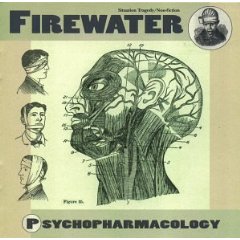 FIREWATER INDUCES MINIONS WITH ‘PSYCHOPHARMACOLOGY’
FIREWATER INDUCES MINIONS WITH ‘PSYCHOPHARMACOLOGY’
As we sit at a table outside tiny Tribeca bar, Yaffa’s, Firewater vocalist-bassist Tod Ashley chain-smokes Pall Malls and half-kiddingly describes his band’s third album, Psychopharmacology (by definition: the study of psychoactive drugs affecting the chemical balance of the brain), as sounding like “Brain Wilson on the wrong medication” before ascertaining, “The Beach Boys Smiley Smile was also a bizarre record with high peaks and low valleys.
Ever since Tod’s older sister turned him on to the Beatles, Frank Zappa, Captain Beefheart, Tom Waits, and prog-rock (which he indelibly labels “pot smoking music”), this terminal underground rock maven has been intrigued by a wide array of music forms. Before leading the visceral industrial punk trio, Cop Shoot Cop (formerly noise mongers Dig Dat Hole prior to enlisting trombonist Dave Ouimet), Tod was in the short-lived Shithouse with future Blues Explosion frontman, Jon Spencer. Although he admits they had fun, there were “too many chiefs, not enough indians.”
When Cop Shoot Cop ran their course, Tod, Ouimet, and a handful of indie rock friends (including Jesus Lizard guitarist Dave Denison and Soul Coughing percussionist Yuval Gabay) created Firewater as a gypsy-klezmer collective. As Tod insists, they were trying to be a “kind of wedding band gone wrong” when 1996’s dauntless Get Off The Crooss…We Need The Wood For The Fire taunted churchgoers with sacrilegious fervor.
Minus Ouimet, ‘98s equally compelling The Ponzi Scheme lyrically dealt with illegal pyramid scams in a fascinating “Peter Gunn” meets Spy Vs. Spy way. Haunted by the recent tragic demise of two depression-bound friends, Tod returned to the studio for the cryptic masterwork, Psychopharmacology.
Penetrating the skull with horrifying cinematic suspense and armed with Oren Kaplan (guitar) and Tamir Muslat (Percussion), Tod’s latest Firewater excursion hurls “an oxygen cocktail” at societal ills, as he bellows ‘all you want is peace/ all you get is pills’ on the chilling title track.
Yet despite the fact the downtrodden “Bad Bad World” (a whiskey barroom duet with Elysian Fields singer Jennifer Charles), the incidental “Car Crash Collaborator,” and the paranoiac mindfuck “Get Out Of My Head” reek of misery and pain, Tod quips tongue-in-cheek, “Firewater fans are a glum bunch who’ve criticized me of being too upbeat on this record.”
Then again, he smirks, “There should be some glimmer of hope in there.”
True fans should track down Jamie Staub’s (skeleton Key/ Everlast) remix of “Get Out Of My Head,” which Tod prefers over the album version. “It successfully captures a Moroccan wedding band meeting the punk rock aesthetic.”
I thought Psychopharmacology was a semi-thematic head trip into the misery and melo-traumas’ of a person’s glum life.
TOD: That describes everyone I know, myself included. It was an interesting couple of years. Two people I knew decided ‘this movie sucks, I’m walking out.’ It makes you re-examine the way you look at the world. I definitely want to stick around. But a lot of artists and musicians aren’t the most stable, happy individuals – which probably leads them into the field of self-expression in the first place. So it’s not surprising these people have trouble dealing with the world.
Did these two now-deceased people have troublesome lives?
TOD: One girl was depressed and couldn’t take it anymore. The other had what others would call an ideal life but still wasn’t happy. It goes to show you, it’s all inside your head. If there’s any kind of theme, it’s ‘Do you accept the brain God gave you,or do you try to do something about it and risk losing whatever spark of individuality you have?
One song I wrote was about a guy I met who was an inspiring saint who had his head together accept the fact he led this spartan life of a monk reading the Bible and living on the street. He gave everything up to devote himself to the spiritual life. He was interesting because he didn’t seem to look like he was on drugs or an alcoholic. He was smart and humorous, but happened to be homeless. We hung out a couple nights, and he told me his life story. It inspired “7th Avenue Static.”
Sprituality has informed Firewater ever since the wryly ‘scarilicious’ wit of Get Off The Cross. On this album, you lyricize, ‘God is great/ God is good/ but he is also made of wood.’
TOD: That line is a jab at organized religion. If God is supposed to mean anything in the 21st century, he has to be more flexible. The concept or portrayal of God is an anachronism. It doesn’t fit today. God has to come up-to-date or be left behind. There’s a lot of evidence Christ, as a historic figure, existed. I don’t think he ever wanted to be God. He was supposedly a radical rabbi teacher with great ideas and good things to say. But building a religion around it was against what he wanted to do.
The parameters of organized religion are man-made and thus subject to interpretation.
TOD: How do you explain the Holocaust? What’s the purpose of disease? If God exists, he’s a sadist. (laughter)
I was highly intrigued by the depression-bound missive, “Woke Up Down.”
TOD: “Woke Up Down” is basically the anti-school, anti-organization educational anthem I was never able to write and finally found the right words. I did two years at Rhode Island School of Design and Film and that was enough. I had to make a decision to raise several thousands to make afinal project or quit. At that point I knew how to load the camera, shoot a movie. I realized I didn’t have anything important to say, so I started a band instead. I’m a frustrated filmmaker, I guess. Music takes less patience and is more direct.
Your suspenseful music seems perfect for cinematic purposes.
TOD: I like spy themes. Morricone and Mancini. I had offers but they haven’t been anything I believed in. I’m a little precious with my songs.
“The Man With The Blurry Face” has a frightening espionage moodiness.
TOD: “The Man With The Blurry Face” is the American everyman that snaps and goes postal. Living the American dream of your 15 minutes of fame through blowing away your boss, your wife, and family. I like the idea when they blur the face of a perpetrator. It represents all of us.

